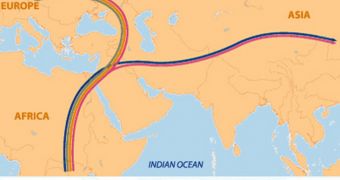At this point, the human population on Earth has spread across the planet, and built a strong and established civilization that is very unlikely to come to an end soon if we don't make it so. But things weren't always this clear when it came to our species' future, as evidenced by the near-extinction event that our ancestors narrowly escaped some 1.2 million years ago. As opposed to nearly 6.8 billion people that the US Census Bureau estimates are alive as of January 2010, that certain period in the distant past saw only about 18.500 of our ancestors roaming the landscape and multiplying, ScienceNow reports.
As an interesting fact, chimpanzees and gorillas are currently classified as endangered, and their populations still feature about 21,000 and 25,000 individuals, respectively. So one could argue that indeed we were closer to extinction than ever before or after. According to anthropologists, our domination over the Earth was not ensured for about one million years in total, as a number of events conspired to always keep our ancestors below the necessary levels to achieve control. Some 160,000 years ago, give or take, the Homo sapiens (our species) started evolving, and it soon moved out of Africa, in a series of treks that would eventually see it populating the entire globe.
“There's this history of a precarious existence not just for our species but for our ancestors,” University of Utah in Salt Lake City (UU) human geneticist Lynn Jorde, who is also the coauthor of the investigation that arrived at these conclusions, explains. The idea that humans and our ancestors have experienced genetic bottlenecks in out evolution is nothing new, as such a history was hinted at many years ago. At the time, biologists noticed that the amount of genetic variations found in our genetic material was a lot narrower than the one in chimpanzees or gorillas, for example.
In the investigation, details of which appear in this week's online issue of the respected journal Proceedings of the National Academy of Sciences (PNAS), all other hypothesized bottlenecks are investigated, including the one that some say took place some 70,000 years ago, when the eruption of the Indonesian supervolcano Toba might have left only as little as 15,000 humans all over the Earth. But the new UU model relies on studying a number of genetic markers that insert themselves randomly into our DNA, called Alus. Their investigation led to the discovery of the 1.2-million-year-old bottleneck, and made the team conclude that our ancestors had an “unusually small population size for a species spread across the entire Old World.”

 14 DAY TRIAL //
14 DAY TRIAL //